- DARSHAN TIMINGS : 5 AM TO 1PM & 4.30PM TO 8PM
- DARSHAN TIMINGS :
- 5 AM TO 1PM & 4.30PM TO 8PM
LINKS
IMPORTANT LINKS
©2025.Chakkulathukavutemple. All Rights Reserved.
All the prosperities of this universe are a blessing that comes from the mother. After all, nature is one with the Goddess and whatever we receive is Her boon. Money, agriculture, handicrafts and everything prosper through her silent sanction. This is done on the eve of famous Vishu between the first and twelfth of the month of Medam.
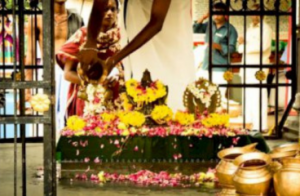
This will close in 0 seconds
This ritual has both the influence as well as tremendous mental sense of awakening. The divine of the goddess is drawn in an elaborate size using differently coloured powders.
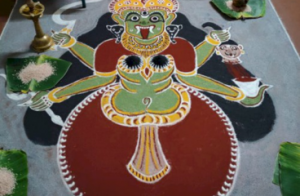
This will close in 0 seconds
Thrikkarthika that falls on the malayalam month of Vrischika is an important day of the temple. This day became famous after a surprising incident that took place in 1851. A friday of 1851 3.30 am in the early morning. Some devotees had gathered to have the "Nirmalya Darsan". Everyone was amazed to see rings of perfumed smoke all around. A rare glow of light was seen infront of the temple. Nobody could discern what was happening. As the priest opened the temple every one was spell - bound. All the lamps inside were alive with a unique touch of brilliance. The idol of the Goddess decked with ornaments and bathed in KumKum seemed extra ordinarily large. A touch of super human feeling pervaded the whole atmosphere. This unparalleled scent lasted only for some seconds. As if in a scene of magic, everything was changed and the sanctum sanctorum was normal as everyday. People were happily embarrassed so to say. They forgot their material existence and stood motionless except that all the lips were chanting the names of the Goddess.
Spiritual consultations were done about this peculiar phenomenon. It was understood that this day was specially liked by the Goddess and that Her powers were at its peak. Thrikkarthika day thus turned out to be very auspicious for worshiping Chakkulathamma.
On this day when there are special rituals like Divyabhishekam, Pongala, kindling the Karthika pillar, Lakshadeepam and Athazha pooja. Lakhs of pilgrims from different corners reach the temple on this day.
The Karthika Pillar
A tall arecanut tree is erected for this purpose. Plantain, straw and similar items are wound over the pillar. This pillar is symbolic of all evils. As dawn blooms, the Goddess is respectfully invoked and seated east wise in front of the temple. The pillar is given fire now. Wild flames seem to reach the sky. Finally the flames subside. The principle is that all the badness is given to flames thereby paving way for all goodness to emerge. Immediately after the burning of the pillar, a number of gentle flames are seen coming alive from the small clay dishes arranged all around. This is the Lakhadeepam or one lakh flames. People kindles the small clay dishes which contain oil and cotton thread. It is a sight of sights to see the whole temple surroundings immersed and illuminated by active flames. This ritual again has a symbolic moral that goodness ultimately dominates badness. The yellow flames dispel all layers of ignorance from the human minds and equip them with real knowledge.The goddess is then invoked back to the temple. Deeparadhan is then performed.

This will close in 0 seconds
The first Friday of every Malayalam month marks a spiritually significant day for the Temple. Devotees who observe rigorous fasting and penance reach the shrine on this day. The number of persons who gather themselves to have a visit of the Mother on this day are literally countless. Special spiritual functions are also conducted on this day. The small idol of the God which is usually placed inside the sanctum sanctorum beside the main idol is carried in procession and brought to the specially arranged place for prayer.Devotee sings hymns and songs of Mother. Scholarly and informative talks are made about spiritual subjects, the chief priest and members of the Pattamana Illom will lead the functions. They will be accompanied by Vedic Brahmin of depth and devotion. As the function progresses the atmosphere is charged with a rare glow of spirituality and divinity.A remarkable feat of the first Friday is the pledge that some devotees take against the habit of intoxication. Use of drugs and liquor have always been a cruel curse upon human beings. How many families loose the foundation and are upturned due to such bad habits, especially of male members. A reminder or pointer may save many such persons. Thousands of devotees which have found it difficult to liberate themselves from the octopi an clutches of alcohol reach the temple on the first Friday. They have come with an ardent decision to brush away their bad habits. They touch the divine sword of the Goddess. The chief priest recites the oath of abstention from liquors. They repeat the prayers. The Cardinal message of this prayers sums up that they will abstain themselves from the use of liquors and drugs and that they will utilize their lives for the well-being of their family and society.Many families have been saved by this prayer. Number of women devotees rush to the temple on Friday to express their oceanic gratitude to the Goddess for having saved their husbands or sons and their family altogether from the dare devil of intoxication. And they see the supreme Mother Goddess with the radiance of a thousand suns spreading Her gentle smile upon them.The pledge against intoxication in front of the Mother goddess is perhaps the one and the only form of its kind in the whole temples in India. It carries an added significance that the divine possibilities of religion are used for transforming human beings towards better citizenship. Wonderful results are recorded in the temple about having cured many persons. The Goddess surprisingly works when men and medicine fail.During the first Friday the devotees receive a unique type of medicine water famously known an s “Oushadha Vellam”. Drinking of this water is proved to heal all types of ailments. A long queue of devotees is seen waiting to receive the medicated water. This water with a number of ayurvedic herbs and roots which have proved results of healing and softening the human body is taken inside the sanctum Santorum. Special Poojas and mantras are performed. The water gains superhuman powers through the blessings of the Goddess. The theories of science or medicine attain super human dimensions when a divine touch falls upon them. The divine medicated water that is supplied during the first Friday is a ocular proof of concept. How many are the pilgrims who have been saved from their problems and despairs through a faithful use of ‘Oushadha Vellam’! The prayer is in a prescribed form packed with meaningful words of spiritual depth. It echoes the aberration of materialism and the vital need to turn towards the Goddess. The prayer requests the Goddess to melt down all the grief, trials and tribulation from the life of the devotees. It also invokes the supreme Mother who works unknowingly behind all the impulses of this universe-that Mother who see the cause and effect behind whatever that happens in this universe.
Participation in these factions and visit to the Goddess are sure to bestow all prosperities like dutiful Children, supreme knowledge, rightful marriage, robust health, annihilation of cruel enemies and like.From the first of Dhanu to the twelfth of malayalam month the devotees observe the “Panthrandu Noyambu”. This is proved to bless the pilgrims with infinite comforts. It is there that wonders takes place. This is what we finds in the famous temple of Chakkulathukavu. It is here that thousands assemble to have a sight of the Mother. It is here that we see the sight of submission and surrender. It is here that a gentle smile and a lotus feet radiates heavenly sunshine upon the flower of human life Yes the supreme abode of universal Goddess “The Chakkulathukavu Temple”.
Celibacy is a must during the day of fasting. The devotee should unfailingly abstain himself from non vegetarian food, liquors and the like. They should have their bath in the morning as well as in the evening. Sick people can take exemption according to circumstances. Both male and female members irrespective of age can observe the fasting observing the fast. Those women who are regularly observing the fast on every Friday need not think of the fasting has broken due to menses periods. They need only remain pray fully and such Fridays should not be taken as a day of fasting for completion of any desired number of Fridays. Those persons who observe the fasting only for one or two Fridays of every month should observe the fasting exactly on those periodic Fridays on the succeeding month of regular order. Mental purity and unpolluted devotion should be developed. Births or deaths in the family should be deemed as breaking the fasting. In such cases fasting must be again begun from the beginning.
Upavasam
Food or drinks should not be used. Remain throughout the day with prayers of the Goddess.
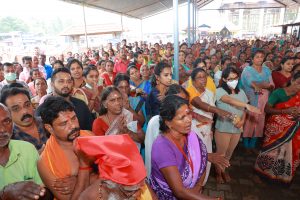
This will close in 0 seconds
Hindu tradition had always bestowed reverence and acceptance to Indian woman hood. If often reminded humanity that a woman who is respected is the cause for prosperity where as a woman who is dishonoured brings misfortunes. We have even women who rose themselves to the pinnacle of spirituality and gave a new dimension to our culture. The Brihadaranya Upanishad pictures Maitreyi whose question to her husband Yaganavalkya is thought provoking. Oh Lord shall I reach that state of fulfillment or Amritvatva if the whole of this prosperous universe becomes mine? Or else tell me how I can reach this state of Amritatva Such subtle tones of spirituality are reflected in the lives of saintly women like Gargi, Sarada Devi or the like. Indra who was at a loss to identify the Brahma was revealed the truth by Mother Goddess. Such situations glorify the position of women in our cultural society. Rig Veda shows us how Indra was all praise for his wife who he believed was the basis of his prosperities. We again
have the brilliant scene of Lord Shiva seating his wife Parvathy in the diamond decked throne in the evening before starting the dance. The Lord was fingering towards the importance of women in the family in order to usher in peace and progress. We may also remember the famous Sanskrit saying
Yethra Naryasthu Poojyante, Remanthe thathra Devatha
Wherever women are adored the Gods get pleased. Our temple has absorbed this glowing concept and introduced a very appealing ceremony The Naree Pooja Women are seated on specially arranged seats. Their feet are respectfully washed. This is an indirect expression of the Indian belief that each woman is manifestation of the divine Mother. Thousands of women are invited to take part in this function. Innumerable devotees stand as witness to this rare ritual that proclaims the potency and glory of the divine Mother.
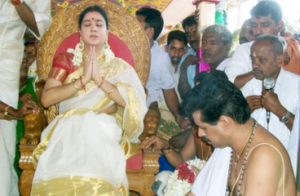
This will close in 0 seconds
This is the phenomenally renowned festival that takes place in the temple during the month of ‘Vrischikam’ (November/December). This is the time when the glory of the Goddess is at its peak. Lakhs of women devotees gather around the temple as early as even one week before the function. The temple premises will be overcrowded and the devotees arrange place for offering the Pongal on both sides of the mains streets. The queue usually extends to a surprising length of 40 km to 50 km.
Rice, coconut and jaggery are bought by women devotees along with round earthen ports for cooking. The Chief Priest lights the main hearth from the divine fire inside the sanctum sanctorum. This fire is exchanged from one over to another. Every year at the time of lighting the main hearth an eagle is found to circle far above the sky. This is an unfailing blessing of the Goddess. The sight of the bird drives the devotees into an inexplicable feeling of ecstasy. They utter the divine names of the mother and the atmosphere echoes and reverberates with a thousand names of the Goddess.
The origin of this ritual dates back actually to the origin of the temple itself and takes us once again to the story of the hunter and his family detailed into he temple history. The hunter and his family members cooked their food in earthen pots. They always set apart a part of their food as an offering to their goddess. One day they were very late to return home after collecting wood in the jungle. They felt extremely sad that they could not submit the daily part of their food to the Devi.Overtaken by unbearable sorrow they fell upon the feet of the Goddess and asked pardon for the delay. Then they rushed immediately to cook the food. But they found to their utter surprise that all the earthen pots were filled with cooked food and fruits. They knew for certain that it was the Goddess Herself who cooked the food for them. They heard a voice in the atmosphere. My Children, I have prepared this food for you. I will always be too near those who are devoted and pure. Take this food and have a rest We find the supreme moment of the Goddess Herself preparing food for the devotee. The Pongala in the temple is a symbolic reminder of this age old incident. Devotees prepare the food as a humble offering to the Mother. It is believed that she accepts this offering in full and blesses cach devotee. Pongala is actually an offering that the devotee submits to the Mother. It is believed that the Goddess herself offers her august presence near each pongala hearth as the cooking is done. Several are the instances where the griefs, problems and confusion of the devotees are washed away through the pongala offering. It is also a symbolic reminder that devotion reaches the full circle through complete submission and total surrender at the lotus feet of the Mother. The pongala festival in this temple is one of the foremost rituals compared to anything of the same in the whole state of Kerala.
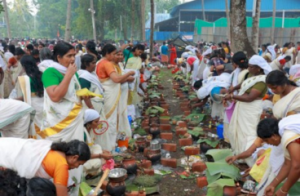
This will close in 0 seconds